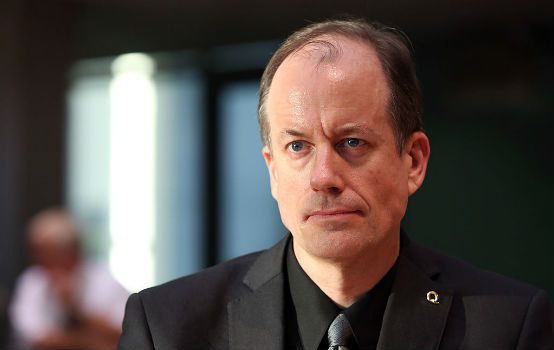Meet Tom Drake, the NSA Whistleblower Cheney Wanted to ‘Fry’

“Find and fry the leaker or leakers. Burn them. We have to make an example of them.”
Vice President Dick Cheney issued that edict after whistleblower Thomas Drake, a former senior executive at the NSA, revealed the unconstitutional mass surveillance regime that had been instituted after 9/11, Drake himself said in a recent interview with The American Conservative.
The constant drumbeat of demands to reveal the names of whistleblowers who filed a complaint against President Trump gives Drake horrible “flashbacks,” he says. And while Republicans endlessly repeat that the American people have a “right to know” their identities, Drake doesn’t agree.
“The identity of the whistleblower is irrelevant,” he says. “The focus should be on the message, not the messenger. The information that was provided doesn’t require the whistleblower to come before Congress.” (Congress has been issuing subpoenas to first-hand witnesses to substantiate the complaint.)
“I have major concerns for the safety of the whistleblower,” Drake continues. “The president of the United States hasn’t minced words in terms of his perspective. If you call out the behavior of a president…they’re going to counterattack. Mine happened behind closed doors. The counterattack on the Ukraine whistleblower is occurring in full view of the public.”
Drake says safety concerns are all the more salient because “the president is fully exposed here. He has enormous power.”
Drake recalls how in his case he was warned by senior leadership at the NSA: “They were looking for leakers to Congress. The warning was crystal clear: you cooperate with them at your peril.”
The way the Trump administration is responding tells you that the whistleblower’s disclosures hit “close to home…just like mine did,” Drake says. The “degree to which the government responds to a whistleblower complaint is the degree to which the whistleblower’s disclosures are accurate.”
Drake knows what it’s like to become a target of the state. He earned Cheney’s wrath when he was working as a senior level official at the National Security Agency (NSA) after September 11, 2001. Alarmed by the NSA’s warrantless surveillance of Americans, Drake reported it to the Inspectors General and to congressional committees. In 2007, after a reporter for the Baltimore Sun published articles on the waste, fraud, and abuse at the NSA, FBI agents, guns blazing, raided the homes of the people who had worked on the Inspector General report and took their computers, books, and papers. In 2010, Barack Obama’s administration indicted Drake under the Espionage Act. Members of Congress, he says, were calling him a “traitor.”
“They wanted me to be sent to prison in an orange jumpsuit. I was facing 35 years. The prosecutors were saying that I was worse than a spy,” he says, pointing out how Trump has used the similar language to describe the Ukraine whistleblower.
After the leak, Drake was unable to find work in the intelligence community. To support his family, he worked at an Apple store. Eventually all 10 felony charges against him were dropped and a plea deal struck on the eve of the trial. Drake was sentenced to community service and probation. U.S. District Judge Richard D. Bennett refused to impose a fine, calling the government’s decision to drag Drake and his family through “four years of hell” only to drop all felony charges at the last minute “unconscionable.”
Because he experienced the heavy personal toll of living as a whistleblower, Drake says he has “concern for the blowback” today’s whistleblowers will face.
“Your entire life gets blown up” and there’s no going back to the way it was before, he says. “If there’s an actual vote for impeachment, then the whistleblower’s life will never be the same.”
“Historically, whistleblowers have a love/hate relationship particularly with those in power,” says Drake. “If you’re in power you don’t like them at all.”
“Weird things happen when you become president,” Drake says. “I saw what happens to people when they have power: it does affect you, believing you affect the lives of others. It’s incredibly tempting to abuse power; it’s seductiveness is overwhelming.”
Drake sounds like an idealist when he talks about the president’s duties under the Constitution, though it’s striking the amount of personal courage it takes to report government wrongdoing. He lost his job; he almost lost his freedom.
The media took a long time to cover Drake’s case favorably. At first they accepted the Obama administration’s narrative that Drake was “a spy who must have done something awful,” he says. But thanks in part to Jane Mayer’s reporting at the New Yorker, journalists slowly began to question whether he was really an “enemy of the state.” Drake went on to win the Ridenhour Truth Telling Prize while still facing felony charges.
The whistleblowers on Ukraine haven’t been subjected to the hell Drake endured because their complaint is public and “highly politicized,” says Drake. “Trump’s such a lightning rod.”
Still, he says, it’s “appalling” that some reports wax poetic and yearn for the presidencies of George W. Bush and Barack Obama.
Just like his predecessors, Drake charges, Trump “has been utterly unfaithful to the constitution.”
Barbara Boland is The American Conservative’s foreign policy and national security reporter. Follow her on Twitter @BBatDC.
Comments